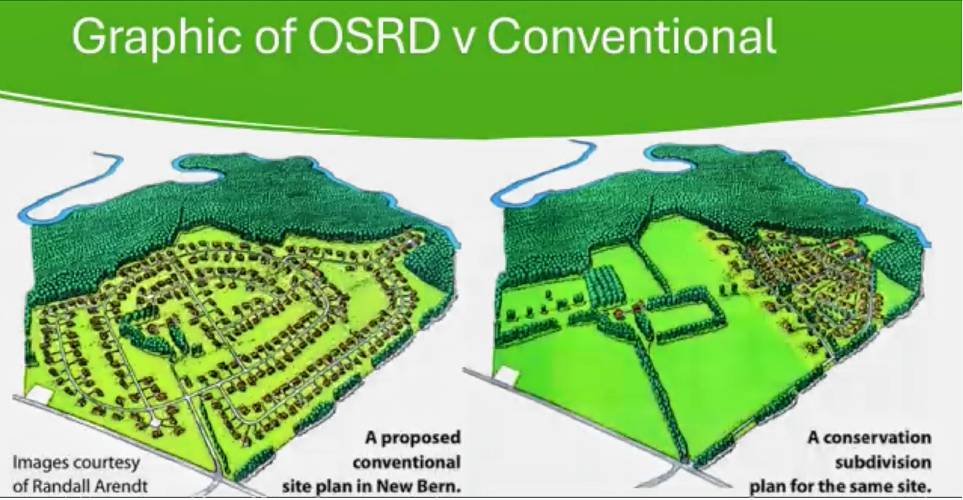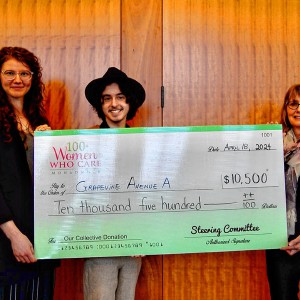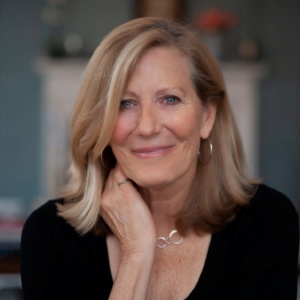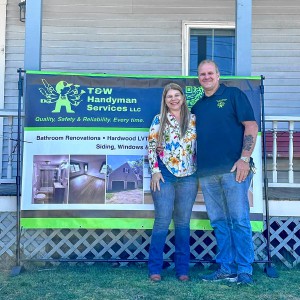Peterborough Planning Board passes zoning change

An example of a development with open space residential subdivision zoning. COURTESY TOWN OF PETERBOROUGH/RANDALL ARENDT
|
Published: 02-29-2024 8:16 AM
Modified: 02-29-2024 2:26 PM |
After a lengthy debate on Monday night and two previous public hearings on the issue, the Peterborough Planning Board passed a motion to rezone all properties in the Family District to the General Residence District.
Planning Board members Stephanie Hurley and Andrew Dunbar voted against the motion.
Director of Planning and Building Danica Malone explained that the Family District is very similar to the General Residence District, with the essential difference being that multifamily housing is not permitted in the Family District.
“The new zoning would reflect the reality of existing uses,” Malone said. “This change supports the goals of the 2023 master plan updates, which say that multifamily housing should be close to downtown and village areas so people can walk or bike easily. Most of the Family District is already within walking/biking distance from our downtown and village areas. Not allowing this kind of development in these areas is a missed opportunity for our community.”
Malone noted that in Peterborough zoning code, “multifamily” means buildings with three or more living units. Sarah Heller, a member of the Planning Board who lives on High Street, pointed out that many of the buildings currently existing in the Family District do not conform, and that the zoning change will more accurately reflect what actually exists in the neighborhood.
The goals of the rezoning include simplification of zoning regulations and districts and allowing for infill in areas which have been identified as priority for more housing.
Hurley expressed concern that developers could “come in and tear down existing houses and put in two or more houses.” Planning Board Vice Chair Carl Staley responded that he felt the scenario was unlikely.
“Tearing down houses does not happen a lot. It is not financially viable. There is very little infill that could happen in the Rural District. There is not a lot of opportunity to develop because of the way the houses sit in the property. The house is sitting in the middle of the lot, they won’t have 100 feet on either side of the house to have two lots. They won’t have the footage,” Staley said. “More than half the properties in the Family Zone are already nonconforming; this will make them conforming.”
Article continues after...
Yesterday's Most Read Articles
The Planning Board was also divided on moving a revised version of the existing Open Space Residential Development (OSRD) regulations forward to the ballot. Gary Gorski, a member of the working group revising the ordinance, spoke to the purpose and goals of the OSRD, which is designed to preserve the town’s natural resources while allowing for denser, clustered development. The ordinance applies only to developments of more than four houses and is not currently a requirement for developers.
Francie Von Mertens of the Conservation Commission said she was not sure what more could be done to revise the ordinance, which will enable the Conservation Commission to review OSRD applications. The revised ordinance would enable developers to apply for current use assessment on natural resource open space, with the purpose of reducing infrastructure cost. The proposed change to the ordinance “decreases potential fragmentation of the town’s outlying open spaces.”
Select Board member Bill Taylor expressed concerns that the ordinance would discourage development, and stated that he was against the revision.
“I really do think this will improve affordability. Clustering housing can make units cheaper to build. Traditional subdivisions could ruin the Rural District,” Gorski said. “We will never find a perfect solution, but this is so much better than what we have in place.”
The motion to put the revised OSRD ordinance on the ballot passed.
The board also passed a proposed expansion of RSA 79-E: Community Revitalization of Tax Relief Incentive, with a goal of encouraging the rehabilitation and active use of underutilized properties in Peterborough, similar to the renovation of the old GAR Hall by Post & Beam Brewing.

 Grapevine receives donation from 100+ Women Who Care
Grapevine receives donation from 100+ Women Who Care The Greenfield Beat: Jesseca Timmons – Diana Dunbar Place focuses on life’s ‘third act’
The Greenfield Beat: Jesseca Timmons – Diana Dunbar Place focuses on life’s ‘third act’ T & W Handyman Services in Jaffrey celebrates new location
T & W Handyman Services in Jaffrey celebrates new location
